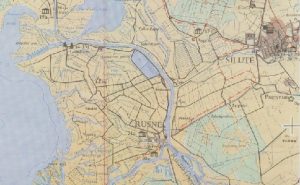Contemporary reports
from the country doctor Arthur Kittel.

Tough energy and a strong spirit of enterprise united the Jewish, Russian timber traders. They bought state and private forests and, in the face of the workers’ great modesty, made it possible to transport the enormous masses of wood from the great Russian forests a hundred miles away. Thus the wood swam downstream, sometimes tousled by floods and storms, to Russ.
During the summer and autumn months there was a lively life and activity here. The rivers were covered with drifts. In the evening the raftsmen sang their melancholic songs at the guard fire. During the day numerous workers from Russ and the neighbouring villages brought the oak sticks and trunks wading through the water to dry on land for good payment and abundant liquor donations. Later they were loaded in barges to Memel for England. There the oak trunks were used to make panels for ship cabins, rooms and precious furniture. The rods were processed into barrels, in which they may have returned after many years as porter, red wine and port wine barrels. Grand merchants from Russia lived in Russia in the two Jewish inns, with the brokers and creators when the wood was sold. And the merchants from Memel came to their four forwarding agents to conclude the contracts. They often lived with them and liked to visit our inn. The Jewish merchants had clothes and linen made for themselves and their families and bought many economic goods. They often took advantage of my medical advice. For more serious illnesses they went to two professors in Königsberg. With their prescriptions they visited me again and followed the ones I had chosen. Sometimes I was invited with the forwarding agent into a Schafferne, whereby the Schaffer gave us: “a ball”: “A Ent with Bulwis, Jauch and Schwarzbier”. These Yiddish-German words mean: The creator gave a company, a roast duck with potatoes, sauce and English porter. The five million Jews living in Russia speak Yiddish-German. Many books and daily newspapers appear in Yiddish, which is understandable and easy to learn for us Germans after a short stay. When the woods were sold, the forwarder took them over for the account of the merchant concerned, measured them and gave the seller a specified receipt, “Consignation”, upon which he received payment in Memel. The forwarder then had the drifts converted into rafts and sent them to Memel as required.
The Jewish cutting mill owners, merchants, wood brokers, innkeepers and traders living in Russia led an exemplary family life. They maintained a prayer house and a women’s bath, supported by their Russian fellow believers, who came there in summer as timber merchants. As the best patients, they adhered to the medical regulations and did not do any charlatal botch-ups. They were charitable against Jews and Christians. For poor Jewish girls they put together the dowry for the wedding. A broker who came to Russia barefoot on a drift as a cook boy and had become rich through efficiency and diligence asked his old friend in Memel: “Nathan, why don’t your daughters marry? To the answer: “You know that,” he put 30,000 marks on the table. “Give each half.” After three months both were happy women.
Many Jews belonged to our associations, but they could not take part in our feasts, because they lived strictly orthodox and would have been disregarded by their Russian fellow believers by disregarding the commandments of food. I often took part in Jewish festivities in which the older men wore black and white striped thorn coats and headgear. The cult official greeted the guests individually after the prayer. The wedding ceremonies took place in the open air or in winter in a room under a throne sky. It was held by four young people.
Extract from: Arthur Kittel, 37 years country doctor in Prussian-Lithuania 1869-1906, Königsberg 1921
Go to directory Places in East Prussia A-Z >>
